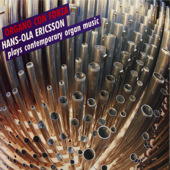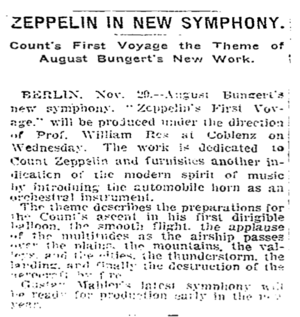Alex Ross's Blog, page 234
May 5, 2011
WTC 9/11
For the New Yorker website I've written a brief comment on Steve Reich's WTC 9/11, which had its New York premiere last weekend and will be heard at the Barbican on Saturday. Allan Kozinn and Seth Colter Walls also attended the Carnegie performance. Back in 2001 I wrote about musical events in the wake of September 11th.
May 4, 2011
Miscellany: Bea's picks of the week
Spring for Music, which Tony Tommasini discussed in last Sunday's New York Times, begins on Friday. Tickets are at most $25; WQXR will broadcast all the concerts live. I'm particularly looking forward to the Oregon Symphony's war-torn program of Ives's Unanswered Question, John Adams's The Wound-Dresser (with the great Sanford Sylvan), Britten's Sinfonia da Requiem, and Vaughan Williams's Fourth Symphony.... Further encouraging inventive programming, the National Endowment for the Humanities has awarded $300,000 to four orchestras — the Pacific Symphony, the Buffalo Philharmonic, the North Carolina Symphony, and the Louisville Orchestra — to develop programs demonstrating music's historical and cultural context.... With a strike averted, New York City Opera is going ahead with this year's VOX series on May 14 and 15: works of Dag Gabrielsen, Arlene Sierra, Allan Jaffe, Huang Ruo, Andrew Gerle, David T. Little, Hannah Lash, Paola Prestini, Jeff Myers, Yoav Gal.... Houston Grand Opera will give free performances of Your Name Means the Sea, a new opera by the eloquent Azerbaijani composer Franghiz Ali-Zadeh, on May 21, 24, and 26.... Invisible Cities, an Italo Calvino opera by Christopher Cerrone, will have its stage premiere at Columbia University's Italian Academy on May 13 and 14.... It's MATA time again! The beloved young-composer fest runs from May 9 to 12. Corey Dargel, whom Steve Smith recently profiled in the Times (listen there to his haunting Last Words from Texas), is featured on May 11.... The long-awaited Third Symphony of Christopher Rouse will receive its first performances this week at the St. Louis Symphony. Saturday's rendition will be broadcast live on St. Louis Public Radio (90.7 KWMU) at 8PM CT. An advance story by Sarah Bryan Miller reveals that the new piece is an homage to Prokofiev's hard-hitting Second Symphony.
May 3, 2011
Non sequitur of the day
From the New York Times of Nov. 30, 1909. The last lines are: "...the airship passes over the plains, the mountains, the valleys, and the cities, the thunderstorm, the landing, and finally the destruction of the aerocraft by fire. Gustav Mahler's latest symphony will be ready for production early in the new year." In 1908, Zeppelin's LZ-4 dirigible had exploded in Echterdingen, fortunately causing no deaths; a massive fund-raising drive kept the count's enterprise afloat. The Mahler symphony in question would seem to be the Ninth. If Mahler saw this item, one can imagine that he felt a twinge of frustration at seeing his latest masterpiece mentioned in such a context.
Is Bungert's monumental Wagnerian tetralogy Die Homerische Welt — Kirke, Nausikaa, Odysseus' Heimkehr, and Odysseus' Tod — worthy of revival? On the basis of a glance at the vocal score of Part III, I would guess not. But I wouldn't mind some day hearing the Zeppelin symphony, which also bears the title Genius triumphans. Nicolas Slonimsky, in his immortal Music Since 1900, refers enticingly to "engines working in fugal counterpoint, the propeller whirring in the kettledrums, and the lyrical Zeppelin leitmotiv soaring over Germany," not to mention a climactic, catastrophic "gust of ascending chromatic thirds." On the other hand, life is short.
May 2, 2011
City Opera and the classical crisis
Flummoxed. The New Yorker, May 9, 2011 (subscribers only).
May 1, 2011
Wagner as Beckett
TRISTAN: Who approaches?
KURWENAL: The King!
TRISTAN: Which king?
Ellen Willis resurgent
 Ellen Willis was the pop-music critic for the New Yorker from 1968 to 1975. She was an extraordinary writer, infusing sharp cultural and political insights into breathtakingly clear and elegant prose. When she passed away, in 2006, many of my colleagues in the pop field, notably Daphne Carr and Sasha Frere-Jones, resolved to make her work better known. University of Minnesota Press has now published Out of the Vinyl Deeps, a collection of Willis's music writing. Nora Willis Aronowitz, Willis's daughter, edited the volume, and Sasha, Daphne, and Evie Nagy contributed commentary. Yesterday, NYU hosted a conference about her work; I was happy to take apart, alongside the likes of Robert Christgau, Ann Powers, Nitsuh Abebe, Rob Sheffield, and Irin Carmon (Jezebel editor and Bach enthusiast).
Ellen Willis was the pop-music critic for the New Yorker from 1968 to 1975. She was an extraordinary writer, infusing sharp cultural and political insights into breathtakingly clear and elegant prose. When she passed away, in 2006, many of my colleagues in the pop field, notably Daphne Carr and Sasha Frere-Jones, resolved to make her work better known. University of Minnesota Press has now published Out of the Vinyl Deeps, a collection of Willis's music writing. Nora Willis Aronowitz, Willis's daughter, edited the volume, and Sasha, Daphne, and Evie Nagy contributed commentary. Yesterday, NYU hosted a conference about her work; I was happy to take apart, alongside the likes of Robert Christgau, Ann Powers, Nitsuh Abebe, Rob Sheffield, and Irin Carmon (Jezebel editor and Bach enthusiast).
I quoted a favorite passage from Willis's writing on this blog back in 2006; here's another, from a review of Dylan's Blood on the Tracks that I hadn't read until I received an advance copy of the Minnesota volume:
On this record the relationship between Dylan's self and his persona seems richer, scarier, and more intense than it has in years. The role I take him to be playing — and my sense of it has as much to do with his former happy-husband posture as his present agonies — is embarrassingly ordinary: it comes from a stock postfeminist drama that appears to be settling in for a long run. A man is married to a woman who has made him a home, in every sense of the word. He assumes that she is as content as he is. Suddenly, she declares that their marriage is intolerable. She reveals needs, expectations, bitter resentments that he never suspected; makes demands that he doesn't know how to meet. He reacts with love and hate, guilt and self-pity, fear and despair. He is angry that she has disrupted not only his comfort but his sense of reality, that she is not what she represented herself to be; and at the same time he is deeply wounded that she has guarded her secret self from him. Eventually, the marriage ends or survives, and he learns something about himself and women or doesn't. In assuming this role, Dylan risks seeming pathetic, even ridiculous. Instead, he makes us see in his dilemma our own unreasonable yearnings, punctured illusions, furious defenses, painful accommodations.
What's wonderful about this passage is that Willis expresses admiration for her subject without coming anywhere close to idolatry. Indeed, she frames him in a feminist perspective that might make a lot of male rock fans uncomfortable. Yet she doesn't take him to pieces, either. She simply sees right through him. The political-cultural insight is indivisible from the lyrical-musical insight. Pop-music writing doesn't get better than this.
Shostakovich kitty picture
According to the notes in this new Naxos release — containing a not quite first-class First Symphony but possibly the best-ever account of the propagandistic Third — the photograph was taken on June 28, 1925, two days before the completion of the First. It comes from the DSCH Archive in Moscow.
April 28, 2011
Organo con forza
 The beautifully bizarre organ sounds on the joke entry below come from a two-CD issue on the Phono Suecia label, with the brilliant Swedish organist Hans-Ola Ericsson — protagonist of one of the finest recorded surveys of Messiaen's organ music — playing works of Ligeti, Sven-David Sandström, Arne Mellnäs, and various others. No recording in my collection demonstrates more vividly the organ's capacity to produce an extraordinary variety of timbres, or, on a more basic level, to scare everybody to death. The set opens with Ericsson's own work Melody to the Memory of a Lost Friend XIII, first heard in 1985. It's the source of the huge cluster crescendo in my peculiar tribute to Kate and Wills. The opening fanfare is from Shostakovich's Salyut, Ispaniya.
The beautifully bizarre organ sounds on the joke entry below come from a two-CD issue on the Phono Suecia label, with the brilliant Swedish organist Hans-Ola Ericsson — protagonist of one of the finest recorded surveys of Messiaen's organ music — playing works of Ligeti, Sven-David Sandström, Arne Mellnäs, and various others. No recording in my collection demonstrates more vividly the organ's capacity to produce an extraordinary variety of timbres, or, on a more basic level, to scare everybody to death. The set opens with Ericsson's own work Melody to the Memory of a Lost Friend XIII, first heard in 1985. It's the source of the huge cluster crescendo in my peculiar tribute to Kate and Wills. The opening fanfare is from Shostakovich's Salyut, Ispaniya.
Fanfare for the Royal Wedding (world premiere)
What manner of music will be chosen for the royal wedding tomorrow? Details are top-secret, although Christopher Warren-Green, the music director of the London Chamber Orchestra, promises that the program will "extremely beautiful, and fitting." Alas, these stock phrases suggest that the avant-garde end of the musical spectrum will be neglected. I suspect that it is too late to submit a score for the nuptial hootenanny, but I offer here a Fanfare that I composed for the occasion. Perhaps it is more accurate to say that I assembled it, but the boundary between composition and assemblage has of course been problematized in this post-postmodern age. Apologies to Dmitri Shostakovich, Hans-Ola Ericsson, Arne Mellnäs, Jan Morthenson, Karlheinz Stockhausen, Richard Wagner, Merzbow, Justin Bieber, and Magnus Lindberg.
Previously: Tristan + Isolde.
In praise of Debussy
"He is as perfect as antiquity or Mr. Pater: one hears genius all the time, and I know of no sensation more delicious: I felt I was listening to music for the first time."
— George Moore to Maud Cunard, 1916, after hearing Ibéria
Alex Ross's Blog
- Alex Ross's profile
- 425 followers








